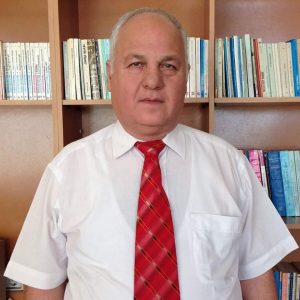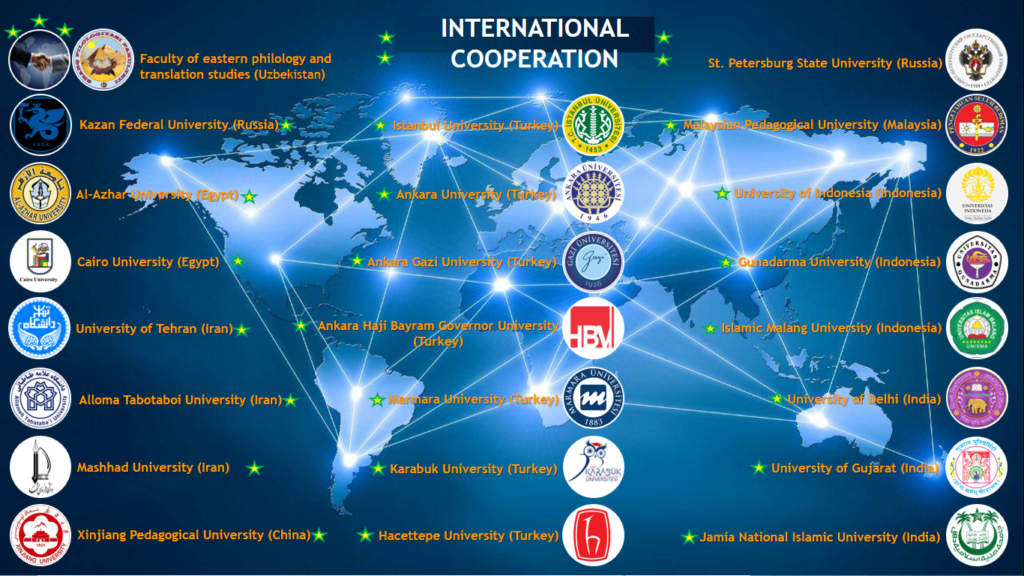FACULTY OF EASTERN PHILOLOGY AND TRANSLATION STUDIES
 |
Shabanov Djumali Kazimovich | |
| Scientific degree and title | Candidate of philological sciences, docent | |
| Post: | Dean of the faculty | |
| Reception hour: | Every day (14:00-16:00) | |
| Tel.: | +998 71 236 15 54 | |
| E-mail: | ||
History of faculty
Philology, which is one of the core areas in Oriental studies, has been taught for many years. Here we can see highly experienced school teaching oriental language and literature in the long-term run.
If we look at the history of the faculty, we may find the information about perfectly learning of Eastern and Western languages, preparing highly knowledgeable Oriental graduates knowing literature of Eastern countries and cultures and doing some fundamental research on the different aspects of oriental languages. From the organization of the Faculty to the present time, there are more than 70 DSc and up to 350 PhD graduates
Among graduates of this faculty, there are some academics: A.Rustamov, U.Karimov, A.Qayumov, some honored state scientists: I.Abdullaev, Sh.Shomuhammedov, A.Qayumov, A.Hayitmetov, U.Karimov, winners of state award: I.Abdullayev, S.G‘aniyeva, A.Hayitmetov, P.Qodirov, winners of international awards: Q.Mahmudov, Sh.Shomuhamedov, E.Rustamov and ambassadors: S.Mirqosimov, F.Teshaboyev, A.Shayxov, S.Inog‘omov, I.Ergashev, A.Usmonov.
There are 6 departments:
- Department of Arabic Philology
- Department of Iranian-Afghan Philology
- Department of South and Southeast Asian Languages
- Department of Classical Philology and Literary Source Studies
- Department of Translation Studies and International Journalism
- Department of Oriental Literature and Comparative Literature
Academic work
- The faculty has 892 full-time students, 115 part-time students and 90 masters taught by more than 125 professors. 19 of them are doctors of sciences (DSc) – professors, 27 of them are candidates of sciences (PhD) – experienced teachers with the degree of associate professor. There are 1 Egyptian, 1 Indonesian, 2 Turkish, 1 Iranian and 1 Chinese professor.
- At the faculty, students are learned 13 oriental languages (Arabic, Persian, Pashto, Dari, Turkish, Uyghur, Indian, Urdu, Malay, Indonesian, Japanese, Chinese, Korean), 3 European languages (English, French, German), as well as the humanities, socio-economic, natural and general sciences. Our graduates will have mastered at least at the level of B2 language skills and fluency.
Bachelor’s Degrees:
- 5120100 – Philology and language teaching (Oriental languages)
- 5120100 – Philology and language teaching (in classical languages)
- 5120200 – Translation Theory and Practice (Oriental languages)
- 5611500 – Guide accompaniment and translation (Oriental languages)
- 5220100 – Journalism (by type of activity)
- 5120700 – Textual Studies and Literary Source Studies
Evening education:
- 5120100 – Philology and language teaching (Oriental languages)
- 5611500 – Guide accompaniment and translation (Oriental languages)
- 5220100 – Journalism (by type of activity)
Master’s program:
- 5A120101 – Literary Studies (Oriental languages and research)
- 5A120102 – Linguistics (Oriental languages)
- 5A120103 – Classical Philology (by type)
- 5A120104 – Textual Studies and Literary Source Studies
- 5A120201 – Comparative Linguistics, Linguistic Translation Studies (Oriental languages)
- 5A120202 – Synchronous translation (Oriental languages)
Scientific works
The scientific activity of the faculty includes the following directions:
- Modern Oriental Literary Languages: Features of the Language System and Its Linguistic Research.
- Comparative study of modern Oriental languages.
- The language of written monuments written in Oriental languages; linguistic examination of written monuments.
- History of Oriental languages: issues of origin and development of written language.
- Source studies and textual studies: textological, paleographic and semantic analysis of the original text; principles of scientific, scientific-critical writing.
- Formation and historical development of the tradition of writing in the history of Oriental languages.
- The emergence of literary language styles, issues of its development.
- Lexicography, the history of terminology in Oriental languages, the study of its scientific basis, the study of traditions in the history of terminology and the development of an integrated system.
- Literature of the peoples of the East; a scientific study of the features of a literary text that are important for literary criticism.
- To study important aspects of literary relations between the Uzbek and Eastern peoples.
- Translation of literary texts in Uzbek and Oriental languages from one language to another and important issues of translation studies.
- Theoretical problems of general linguistics and comparative typology
It is noteworthy that most of the faculty members are young. Their involvement in science and scientific guidance is well established in the community. There is no single teacher in the faculty. Old and young alike, in addition to his pedagogical work, he conducts scientific work.
Spiritual and educational work
- The faculty organizes celebrations on the occasion of the birthdays of artists, statesmen and commanders who have left a bright mark in the history of the Uzbek people. Events will also be held on the occasion of anniversaries in the history of our country. The students of the faculty take an active part in the spiritual and educational competitions among universities, districts, cities, republics, internationally or higher education institutions and take worthy places. In the annual university-wide football competitions “Rector’s Cup”, “Dean’s Cup”, our teachers and students are showing good results in the team of the faculty.
- Mechanisms have been developed to increase the coverage and effectiveness of spiritual and moral education and enlightenment activities carried out at the faculty on 5 initiatives. According to him, in order to further increase the political and legal literacy of students, as well as to inculcate in the minds of young people the political and social processes taking place in our country, the speeches of the President of the Republic of Uzbekistan, interviews with government officials and various events abroad – Detailed information about the events is regularly covered in the “Information and coaching hours”, organized in collaboration with the dean’s office and departments.
- The faculty regularly organizes roundtables with famous Uzbek poets, writers, artists, statesmen, artists, athletes. Students visit historical sites, monuments, cities, various museums and theaters, military units, orphanages, charities
Partner organizations and institutions of the faculty:
- Institute of Oriental Studies named after Abu Rayhon Beruni of the Academy of Sciences of the Republic of Uzbekistan
- Writers’ Union of Uzbekistan
- Museum of Literature named after Alisher Navoi of the Academy of Sciences of the Republic of Uzbekistan
- Institute of Uzbek language, literature and folklore of the Academy of Sciences of the Republic of Uzbekistan
- Institute of History of the Academy of Sciences of the Republic of Uzbekistan
- Representative office of the Japanese company Mitsubishi in Tashkent
- Academy of the Armed Forces of the Republic of Uzbekistan
- National Library of Uzbekistan named after Alisher Navoi
- State Museum of the History of the Temuri
- Yunusabad academic lyceum under Tashkent State University of Oriental studies
- Chirchik Higher Tank Command-Engineering School
- The magazine “Star of the East”
- Journal of World Literature
- The Golden Pen newspaper of the Muhammad Yusuf Foundation
- School No. 22 in the Almazar district of Tashkent
- 119th school of Almazar district of Tashkent city
- L.B. Shastri High School No. 24, specializing in Hindi
- Travel Asia Company
- International school
- MAR Center for Arabic Language Teaching at Cairo University
- State Committee of the Republic of Uzbekistan for Tourism Development
- Committee on Religious Affairs of the Republic of Uzbekistan
- International Imam Bukhari Foundation
- Ministry of Public Education of the Republic of Uzbekistan
- Ministry of Higher and Secondary Special Education of the Republic of Uzbekistan
- AKELA GROUP MACHINERY
- Department of Oriental Languages, Uzbek State University of World Languages
- “Ibrat” boarding school specializing in foreign languages, Turakurgan district, Namangan region
- Samarkand Institute of Foreign Languages
- International Islamic Academy of Uzbekistan
- Uzbek-Pakistani Friendship Society
- Uzbek-Afghan Friendship Society
International cooperation organizations and institutions of the faculty:
- Kazan Federal University (Russia)
- Al-Azhar University (Egypt)
- Cairo University (Egypt)
- University of Tehran (Iran)
- Alloma Tabotaboi University (Iran)
- Mashhad University (Iran)
- Xinjiang Pedagogical University (China)
- St. Petersburg State University (Russia)
- Malaysian Pedagogical University (Malaysia)
- University of Indonesia (Indonesia)
- Gunadarma University (Indonesia)
- Islamic Malang University (Indonesia)
- University of Delhi (India)
- University of Gujarat (India)
- Jamia National Islamic University (India)
- Istanbul University (Turkey)
- Ankara University (Turkey)
- Ankara Gazi University (Turkey)
- Ankara Haji Bayram Governor University (Turkey)
- Marmara University (Turkey)
- Karabuk University (Turkey)
- Hacettepe University (Turkey)

Spelling error report
The following text will be sent to our editors: